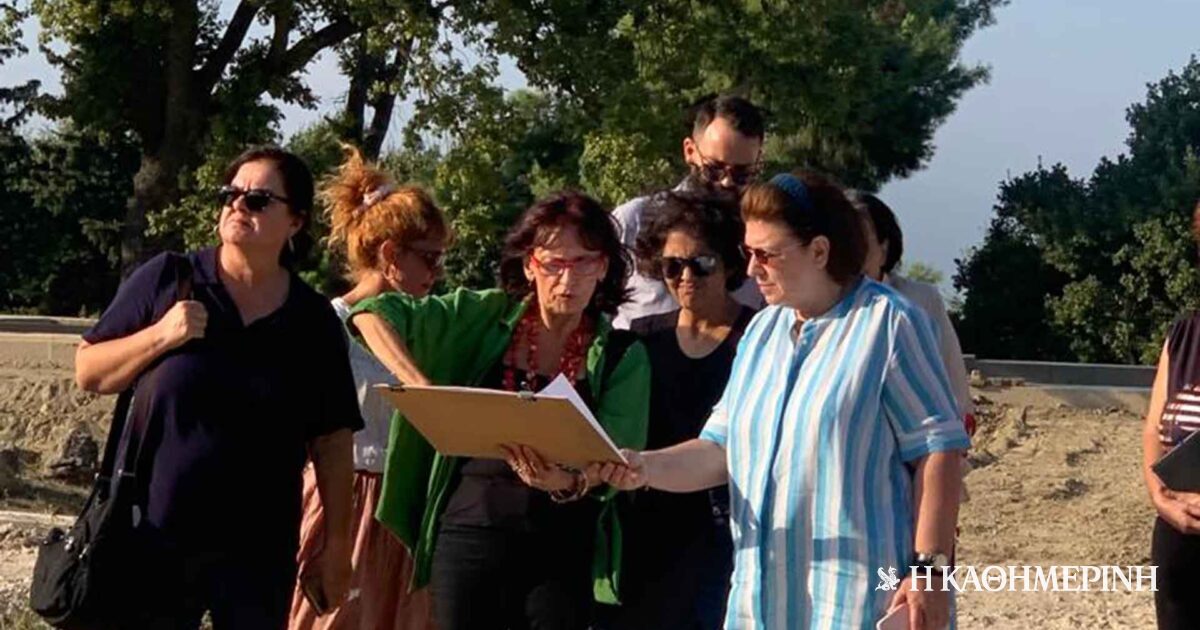
Born and raised in the upper city Thessaloniki, in a 19th century Ottoman house. Ever since she can remember she has loved animals. When, at age five, she realized one afternoon that what was boiling in their kitchen was the rabbit she had been playing with in the yard, she grabbed the pot, threw it out the window, and burst into tears. Explosive and willing to do anything to defend her “holy things and savior” from a young age. At the age of six, Angeliki KotaridisThrough a book of myths, a gift from her mother, she also fell in love with the ancient Greeks. “Without understanding how or why, I said I would be with them from now on.” and he. Customized and non-stop.
She studied archeology in Thessaloniki, fulfilling her childhood dream. On September 5, 1977, when she was a third-year student, she found herself taking an internship in Vergina, which at the time was a small village with a café, a bar and the only phone in a kiosk in the square. She chose it because Manolis Andronicus, her professor at Aristotle University, had captivated her with his teachings. “He had a sharp political mind, and he also dealt with the philosophy of science, with the reason why things exist,” he says. But there was another reason: as an elected student representative, she didn't want to take someone else's place. In those years, almost everyone preferred other fossils, such as Dion or Sicyclus. Andronicus, the master, as he calls him, “was not as fashionable as Pandermalis and Despennis.” Of course, the following year, after the discovery of Philip II's tomb, everything changed. Aiges was to become the place of Aggeliki Kottaridis, a field of research, study, teaching, hard work and unremitting efforts. She describes it herself with a simile: “I'm like a hamster in a cage: I wake up and sleep with the Macedonians on my mind.” From 1989, when she was appointed curator at Imathia-Virginia as the first winner of the Antiquities Service Competition, and until a few days ago, when she retired, her goal was to introduce a different standard into the collective consciousness and subconscious: to understand as many Greeks as possible that the Macedonians were different. “A Homeric-type society, where people lined up next to their leader, but it was not a king in the way we understand it, a Louis Caturge type. There was no absolute monarchy. The Macedonian king was a 'father' to his subjects, which is why he was usually called Alexander (from alexo, to repel enemies ) or Amyntas (he who defends himself to the people, protects them). He was also being elected. The king's son did not inherit the throne. Most people don't realize that, so they don't understand the miracle that happened with the goat.” But during its days, beyond the countless publications, conferences, and global scientific dialogue, a miracle occurred: the multicenter. Goat Museum. In permanent and rotating exhibitions, the complex history of Macedonia is revealed before the eyes of visitors. In places not visible to the public, there is an important research center, a laboratory where hundreds of treasures “come to life” again thanks to the care of the conservators. Angeliki Kotaridis knows the museum and archaeological site well. Everything in its rooms bears the stamp of scientific knowledge and its aesthetics.
“Archaeology and antiquities only gave me happiness. The pains I was experiencing helped me overcome them. Philippos and Alexandros never betrayed me,” says Angeliki Kotardis.
However, if asked about her personal account, she would respond humbly. “Archaeology and archeology only gave me happiness. Whatever pains I had, they helped me overcome them. Philip and Alexander never betrayed me. The two of them, like Plato, who was always the compass in my life, showed me that my path should always be upward. To become better “And better.” And if someone tickles her with the various theories she hears every now and then about who is buried in Aegis and asks her master, it will awaken that angry little girl inside her: “Journalists are to blame for asking no.” -Experts to give their opinions – for the course, for a few “clicks”. “It's like having a toothache and going to the orthopedist!” he told me in our recent phone conversation.
As for her life from now on? She hopes that “my mind will remain flourishing and that I will deal with writing because I have neglected it. 'Let us say our few words because tomorrow our soul will sail,'” says Sefris. This is how I imagine her: studying and writing passionately, in a house with a large garden, where Mrs. Poe and her dog and cats will play.

“Total alcohol fanatic. Coffee junkie. Amateur twitter evangelist. Wannabe zombie enthusiast.”





More Stories
NASA: Signs of ancient life on Mars found in Chiava rock
Motorola Razr 50 Ultra Review – Review
6 Phrases That Show You’re Mentally Stronger Than Most People